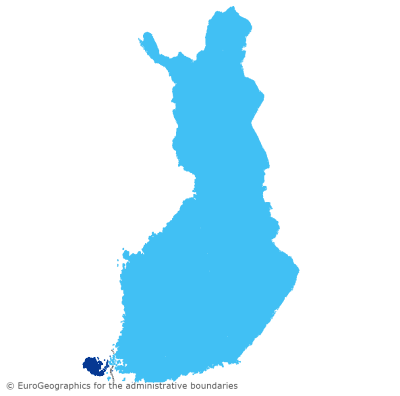
The Åland Parliament (Ålands lagting) was established on 9 June 1921.
Number of Members of Parliament
30
Length of the parliamentary mandate
Four years.
Mode of selection of the Members of Parliament
Direct election. For further information, see the Act on the Autonomy of Åland, available here (EN).
Population included in the constituency of the regional parliament
28.355 inhabitants.
- Competences (legislative and non-legislative), legal bases and policy areas where the regional parliament is active
- List of committees/sub-committees or working groups in the regional parliament
- Committees in charge of scrutinising subsidiarity
- Staff in charge of subsidiarity scrutiny
- Subsidiarity check
- Cooperation/coordination at the regional level
- Cooperation/coordination at the central level
- Cooperation/coordination at the cross-regional level
- Cooperation/coordination at the EU level
Competences (legislative and non-legislative), legal bases and policy areas where the regional parliament is active
Legislative:
These competences are specified in Section 18 of the Act on the Autonomy of Åland 1991/1144 (see link above) and include inter alia:
- public order and safety;
- building and planning, adjoining properties, housing;
- the appropriation of real property and of special rights required for public use;
- tenancy and rent regulation, lease of land;
- the protection of nature and the environment, the recreational use of nature, water law;
- prehistoric relics and the protection of buildings and artifacts with cultural and historical value;
- healthcare;
- social welfare; licences to sell alcoholic drinks;
- education, apprenticeships, culture, sport, youth work; the archive, library and museum service;
- farming and forestry, the regulation of agricultural production;
- hunting and fishing;
- animal protection and veterinary care.
Moreover, the Parliament is responsible for adopting the budget for Åland (Section 44 of the Act on the Autonomy of Åland).
Non-legislative:
The Parliament is inter alia responsible for controlling the Government of Åland.
List of committees/sub-committees or working groups in the regional parliament
The Parliament has four standing committees:
- The Legal and Cultural Committee;
- The Finance, Industry, Trade and Agriculture Committee;
- The Social and Environmental Committee;
- The Review Committee.
In addition, there is an Autonomy Committee responsible for international relations and matters related to autonomy.
For further information, see here (EN).
Committees in charge of scrutinising subsidiarity
The Autonomy Committee.
Staff in charge of subsidiarity scrutiny
There is no staff specifically in charge of subsidiarity scrutiny.
Subsidiarity check
Nature (selective/systematic): Selective.
Procedure: : EU draft legislation is only checked if a Member of the Regional Parliament or its Autonomy Committee takes the initiative to do so. EU draft legislation is e-mailed to all Members of the Regional Parliament for information. Members can take the initiative to have EU draft legislation examined in the Autonomy Committee. The Autonomy Committee decides whether a reasoned opinion should be issued on the EU draft legislation. The opinion is sent within a period of six weeks to the Finnish National Parliament, which examines the case in the Grand Committee. The Grand Committee's proposal is presented to the Parliament in plenary session. The Åland Parliament's reasoned opinion must always be attached to the Finnish Parliament's communication on the matter to the EU institutions, irrespective of whether or not the National Parliament decides to issue a reasoned opinion. This flows from Section 59a of the Act on the Autonomy of Åland. Åland’s Government also examines all EU draft legislation with regard to subsidiarity. The Government may inform the Parliament that there are grounds to carry out a subsidiarity check on a given matter.
Cooperation/coordination at the regional level
See the answer to the previous question. Both Åland’s Parliament and Government carry out subsidiarity checks. The Government’s checks are not laid down in law, but only in a concept paper with guidance notes.
Cooperation/coordination at the central level
The cooperation between the Regional Parliament and the National Parliament is technical in nature. The National Parliament e-mails EU draft legislation to the Regional Parliament. There are also informal contacts between officials. Otherwise, subsidiarity checks are carried out independently by the Regional and National Parliaments. The Regional Parliament's right to issue a reasoned opinion is laid down in Section 59a of the Act on the Autonomy of Åland (see link above).
Cooperation/coordination at the cross-regional level
The Åland Parliament is the only regional parliament with legislative powers in Finland.
Cooperation/coordination at the EU level
The Parliament has informal contacts with EU officials and Members of the European Parliament. Moreover, the Parliament participates in CALRE (Conference of European Regional Legislative Assemblies).
